 Terry Johnson of The Flamingos – Career Story
Terry Johnson of The Flamingos – Career Story
by Kirk Lang
In the year 2021, there are only a handful of R&B artists from the 1950s that are still out there able to grace a stage and bring smiles to people’s faces. Terry Johnson, former guitarist, vocalist and vocal and music arranger for The Flamingos, is one of them.
However, he must wait for some normalcy to return after a worldwide pandemic brought the entertainment business to a screeching halt. Performers in general – of all levels – have been out of work for a year. With vaccinations being administered, there is light at the end of the tunnel, as far as Johnson being able to dust off his suit and winged tip shoes and take the microphone once again with Terry Johnson’s Flamingos.
For now, Johnson and his wife Theresa Trigg, the musical director of the group, as well as a vocalist, will bide their time until tour dates come in.
“We’ve been blessed,” he said. “We invested money when we were making big money and built our own studio. All I do is write music so every day we go in the studio. We’re writing songs. We’ve got our own YouTube channel and we’re putting things up regularly. I just put up a new track called “You’ll Never Walk Alone.” So that’s what I’ve been doing man, staying busy, writing, trying to stay as healthy as I can and try to walk or ride my bike whenever I can.”
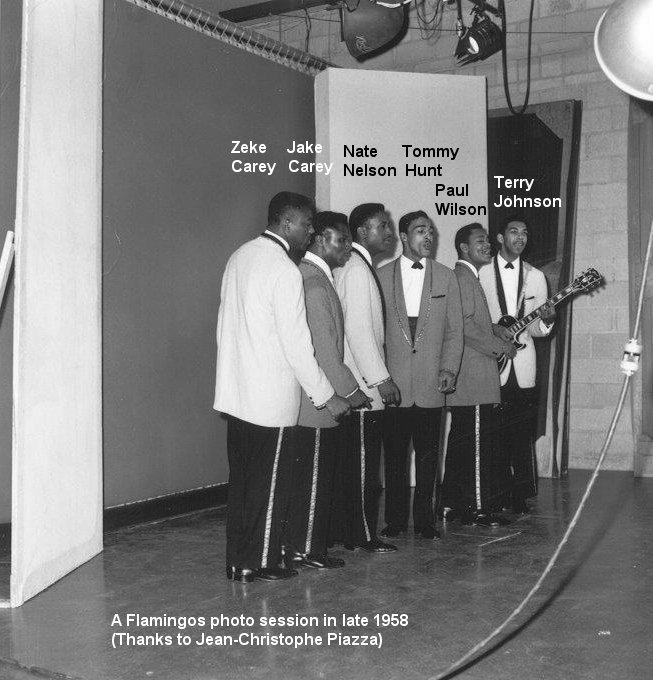
In old photos of the 1950s era Flamingos, Johnson can be seen with guitar in hand. However, he was much more than the group’s guitar player and vocalist. He was the mastermind behind the group’s biggest hit, “I Only Have Eyes For You.” On the cusp of turning 20 at the end of 1959, Johnson came up with a new arrangement for the song, an old standard given to him by End Records’ George Goldner. It was one of 33 songs Goldner assigned Johnson to re-arrange and work his magic. Goldner knew Johnson had put his stamp on “Ladder of Love,” a modest hit The Flamingos had when they were previously signed to Checker Records, a subsidiary of Chess Records.
“He was the president [of End Records],” said Johnson. “He gave me 33 songs because he knew I was doing the musical arrangements and the backgrounds.”
He added, “He and Richard Barrett (A&R man for End) went down to the music store. The Platters were big then, and The Platters were doing like, white music, so they picked out 33 songs for me to re-arrange. They wanted us to ride on the coattails of the Platters. They said, ‘The Platters are going in the right direction, so we need to do something like The Platters, only sound like The Flamingos.’ They said, ‘Terry, put your spin on them. We like what you did with “Ladder of Love,” even If they didn’t put it out the right way’ “
Checker Records subsequently added white female harmonies on top of the original harmonies the Flamingos had laid down.
“They were trying to make us sound really white [at Checker],” said Johnson. “They put the white voices on top because they wanted it to sell to whites because they knew we had a sound. Nate Nelson had a nice voice.”
At End Records though, there would be no such funny business. What Johnson conceived was what ended up on being laid down in the studio. As far as those 33 songs he was given, “I got 32 songs knocked out for him (Goldner),” said Johnson.
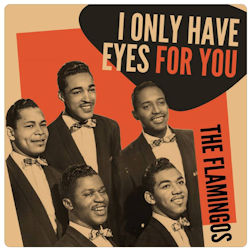 He added, “Fast, bam, bam, and all beautiful. I mean just heavenly sound man. It was just my guitar and the bass and drums. No piano. Just those three pieces. But we had a sound and that thirty-third song I couldn’t figure out what I wanted to do with it. It was “I Only Have Eyes For You.” And it was sounding, it was like, it was corny. The chords didn’t sound right and I don’t know, I didn’t like it. So I had a habit of lying in bed with my guitar on my chest and practicing my guitar.
He added, “Fast, bam, bam, and all beautiful. I mean just heavenly sound man. It was just my guitar and the bass and drums. No piano. Just those three pieces. But we had a sound and that thirty-third song I couldn’t figure out what I wanted to do with it. It was “I Only Have Eyes For You.” And it was sounding, it was like, it was corny. The chords didn’t sound right and I don’t know, I didn’t like it. So I had a habit of lying in bed with my guitar on my chest and practicing my guitar.
“I was trying to come up with this last song and all of a sudden, Nate Nelson, he was being funny, he said, ‘Hey man, why don’t you try to make it sound like that Russian song? The Song of The Bolga Boatmen. Pull away now, duh-duh-duh. He was laughing that day ‘cause he was trying to help me but he was really making fun.
The group was staying at a New York City hotel.
“I fell asleep,” said Johnson. “And I heard the whole arrangement in a dream, from the beginning of the chords that I played to the background harmonies, the bridge and the way it sounded. And I woke up. It was four [a.m.] and I called everybody. I called them and I said, ‘Come to My Room.’
Some asked if they could work on it the next day.
“I said no, I don’t want to forget it,” Johnson said. It’s fresh now. We had no cassette recorders then. You know what I mean? There was no way to remember it.”
When everyone gathered and began to work on the song, the response was less than enthusiastic.
“I was proud of it,” said Johnson, “Because I knew God had given it to me. I thought it was beautiful. They said, ‘It sounds like sh*t Buzzy (Buzzy was Johnson’s nickname). You woke me up to play some stuff like this?’ I said, ‘What?’ They said, ‘No man, we can’t sing nothing like this. It doesn’t sound rIght. It doesn’t sound good.’ So I said, ‘We’re going in the studio anyway.’”
The group went into the studio the next day. They were almost finished with the album Flamingos’ Serenade. Nelson talked Johnson out of singing lead.
“When we finished singing that song everybody turned around and looked at me like, “Damn, that’s different.” Goldner wasn’t in town when the group laid down the track but when he returned, he had some choice words for Johnson and called the 33rd track “garbage.”
“He said, ‘This doesn’t sound like ‘50s music,’” said Johnson. “I said, ‘George I don’t care, it came in my dream, it came in my dream.’ He said ‘Terry, don’t you ever, don’t you ever go in that studio without my permission, or without me and Richard being there, and I mean that.’ He was so pissed off with me, but he said he was going to put it on the album anyway.”
Within four weeks, after deejays got a hold of the album, can you guess which cut they ended up taking a liking to more than the others?
“And before we knew it that song was our number one,” said Johnson. About two months later, Goldner called Johnson into his office and basically apologized and told him he had carte blanche to go into the studio whenever he felt like it, without he or Barrett around.
What does Johnson think made the song so special?
“It had a mysterious sound to it,” he said. “It didn’t sound like anything that was out there. And that’s what made it so successful, because it was so different. It was something about “I Only Have Eyes For You,” with the piano not changing the chords with everything else, but holding those three notes. It was just so different. I liked it and I just had a feeling in my stomach, every time I heard it, like, this song is special.”
When it became a certifiable hit, “They loved me after that,” said Johnson. “Write some more songs. Write some more songs.”

Johnson brought a pop sensibility to the group when he joined the ranks in 1956. The pre-Johnson Flamingos were clearly a rhythm and blues group. With Johnson’s influence they became more pop-oriented and this was before End Record was trying to give them a Platters feel. In fact, when he auditioned for The Flamingos, he played and sang Flamingos tunes but also did the Everly Brothers’ “Wake Up Little Suzie.”
“They said, ‘That’s white.’ I said, ‘Yeah, but ‘s got a beat.’ And all of a sudden, they started paying attention to what I was doing. The majority of them didn’t want it (the white artist songs) but Nate said, ‘Hey I like that, that’s interesting. We need something different.’ And we were stretching out of not just doing Flamingos songs. We were starting to work in different clubs. We were working this one club in Miami, The Rocking MB, it was white. It was all white so we had to go in there with different styles of music. We couldn’t go in there just doing R&B, so I started you know, just teaching them other stuff I had been listening to an I liked, and they kind of went along with it. And before we knew it we had another style of music we were putting out there and a lot of the while places were starting to book us but they wouldn’t book the black groups (doing solely black music).
As a child, Johnson wasn’t allowed to listen to R&B in his parents’ Baltimore, Maryland home.
“They liked the 40s music,” said Johnson. “Like when TV first started, it was like Arthur Godfrey, the McGuire Sisters, Steve and Eydie Gorme and Nat King Cole. I could listen to Nat, I could listen to Sammy Davis Jr., Frank Sinatra, that’s the kind of music I was really raised on. And then, as I started going to high school and I started meeting other friends, they would say, ‘Come on over, we’re going to listen to some music, and then all of a sudden I heard about Little Richard, and Fats Domino and Chuck Berry. I said, ‘Oh wow, what kind of music is this?’ And then learning how to dance with the chicks, and then holding them close, you know. It was another whole lifestyle for me because I was always protected, but then, hearing the kind of music I liked, especially “Lawdy Miss Clawdy” by Lloyd Price.
As far as black vocal groups, Johnson liked The Orioles, The Five Keys and The Ink Spots. Growing up in Baltimore, Maryland, he had direct exposure to vocal harmony/R&B artists.
“Down the street from me on the other side of the street was Sonny Til (lead singer of The Orioles),” said Johnson. “And on the other side of the street of him was Earl Hurley of The Swallows. And then up the street from me was J.R. Bailey of The Cadillacs. And one of the Cardinals also lived in the area.”
Johnson used to go to the Royal Theater and watch in amazement as Til sang.
“He would bend his body over to the side and then he would just, it seemed like he was singing his soul out,” he said. “I liked that.”
As far as The Swallows’ Early Hurley, Johnson used to see him playing his guitar while walking down the street. Expressing interest in his instrument, Hurley asked him if he wanted to learn how to play. Johnson expressed his desire to learn.
“So he let me play his guitar,” said Johnson. “My fingers got really sore because I never played it before. And then I kind of fell in love with it.”
Johnson subsequently met Swallows guitarist “Money” Johnson who showed a 14-year-old “Buzzy” how to play various chords, riffs and bass runs.
Interestingly, Johnson would end up with a guitar and amplifier from Fred’s Music Store only because his first instrument of choice – a Selma tenor saxophone – was out of stock. He was so influenced by Saxophonist Arthur Prysock’s biggest hit, the instrumental “Hand Clappin,’ ” that he told his mother he wanted a sax. A music store worker offered up other saxophones but Johnson was adamant it had to be a Selma. Told one could be ordered for him, Johnson apparently couldn’t wait. He wanted to walk out of the store that day with something in his hands. Looking at all the guitars on the wall, and since Johnson by this time was already getting some pointers from Hurley and Money Johnson on guitar, he decided a guitar it would be.
“Once I got it, I would just go around and ask everybody, ‘How do you do this? How do you do that?’ I picked it up and I started learning how to read music,” said Johnson.
It wouldn’t be long before he formed his first R&B group with four high school friends, including Billy Thompson, who introduced Johnson to R&B music and early rock ‘n’ roll on his record player at his parents’ home.
At first, “We didn’t have a name but we got our parents to buy us these light blue suits with white shirts, a blood red tie and blood red cuff links, and white shoes,” said Johnson. “We were sharp.”
He added, “And everywhere we went we would do other people’s music. We had a sound. And people said, ‘You know, you guys sound so good, you could whisper and it would sound so good.’ We said, ‘That’s a great name. The Whispers. And we would win every talent show. Everywhere we went we won first prize. And so we got really good.”
When the group had four original songs, Johnson and crew, in late 1954, traveled to New York City to try to sign with a label. One record company executive said he liked what he heard but he had enough artists.
“And then we went to 1650 Broadway,” said Johnson. “That’s where everybody was. All the writers. All the recording studios, [but nothing came of it]. And so we got a little discouraged. Nobody really wanted to give us a shot.”

As The Whispers were headed home to Baltimore, group member Eugene “Lump” Lewis decided to make a call to Gotham Records, based in Philadelphia, during a pit stop and ask if the guys could audition. Things couldn’t get any worse. Johnson just had his guitar stolen during the stop, taken from the back window of the vehicle. They made it to the audition before the requested time and with the help of a borrowed guitar, performed their four original songs, two of which Johnson wrote, “Are You Sorry?” and “Fool Heart.”
However, it wasn’t merely an audition. The exec recorded them in the studio. Sometime in early 1955, Johnson, at home with his family, heard “Fool Heart” come over the airwaves on Hot Rod Hubert’s WITH station.
“If you could get on Hot Rod’s show man, you had it made,” he said. “When I heard “Fool Heart” I went crazy. That’s us. That’s us. That’s us.” Johnson sang lead on the song in his first tenor voice, doing his best to sound like Clyde McPhatter.
“And my sisters and everybody came in, my father and mother, they were all smiling and laughing and they were so proud of me,” said Johnson. “And then I went over to Billy Thompson’s house. I told him I had heard it. He said, ‘I heard it too. I heard it too.’ So it was like magic, hearing yourself. It felt like you were in the big time then, on the radio.”
Johnson said the station played the song for about a week straight and after that, nothing.
“I would have the station on all day,” said Johnson. It turned out Lee Andrews and The Hearts, another group with Gotham Records, but more well known, resulted in The Whispers getting bumped from rotation.
“And that’s when I got really disappointed and brokenhearted,” said Johnson. “I kind of gave up.”
However, he would attend a show at The Royal Theater that featured The Five Keys and The Flamingos.
In awe of the harmonies, the sharp suits, the adroit dance moves, Johnson watched The Flamingos and at one point, “This is the truth. I saw myself on stage. I was sitting out in the audience but I saw me up there, sitting with them.”
Johnson subsequently made his way backstage, because of his connection to Jake Carey – who attended the same synagogue as he – and relayed his vision to the group.
“They kind of laughed,” said Johnson, but the interesting thing was, the Flamingos were actually looking for a new member, as Johnny Carter was being drafted into the service. They wanted a first tenor as well as a guitar player. Johnson said he could meet both needs and was given an audition the next day.
However, two months passed before Johnson got a call on Christmas Eve 1956 from Carey asking if he still wanted to be a Flamingo. Johnson quickly answered in the affirmative and was directed to meet Carey at his home in Philadelphia the next day.
“So that was my Christmas gift,” he said. “I’ll never forget it.”
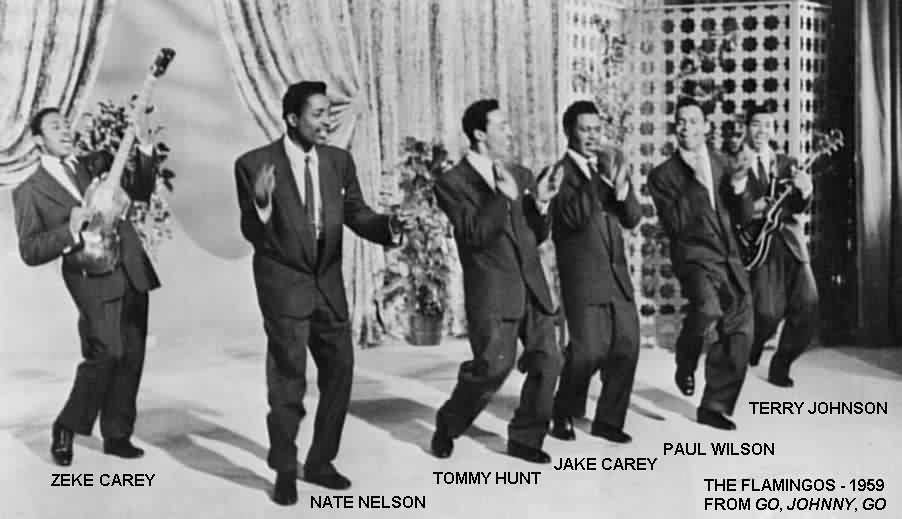
It would be a good run for Johnson. Not only did he get a taste of Hollywood with The Flamingos, appearing in the 1959 Alan Freed movie Go, Johnny Go!, he was inducted into the Rock and Roll Hall of Fame as a member of The Flamingos. He’s also seen induction into the Vocal Group Hall of Fame and the Doo Wop Hall of Fame. The group’s second biggest hit was “Nobody Loves Me Like You Do,” a song written by Sam Cooke, a friend of Johnson.
“Sam always loved the way I played guitar so he wrote that song for us,” said Johnson.
When Tommy Hunt left the group around 1961, The Flamingos splintered off into two groups, with Johnson’s version being called The Modern Flamingos.
“They weren’t the Flamingos and they all had big egos and they all were troublemakers,” said Johnson. “They’d wave a drink, or were getting high all the time. I just couldn’t take it anymore.”
An old friend, Smokey Robinson, helped transition Johnson into a new musical phase of his career, writing and producing for Motown. It turned out to be a 10-year gig. When Johnson sought out Robinson at a show to ask if Motown head Berry Gordy might be interested in a few of his songs, Johnson had no clue Smokey Robinson, the artist, was vice president of the entire operation.
The songwriting team of Holland-Dozer-Holland was leaving Motown and Robinson was looking to put his own team together. Robinson asked Johnson if he was interested in joining forces with him.
“I said, ‘Hell yeah!’ And after being with him for about three weeks, I found out that Smokey was Berry’s vice-president,” said Johnson, adding, “He picked me this big office. He picked me a secretary. He laid out the red carpet for me…And he’s got me at Motown and a lot of the producers and writers that had been there for years were wondering how in the world could I come in there and get a spot like that and Smokey gives me the red carpet treatment. A lot of people didn’t like me but I was blessed.” Johnson and Robinson’s most notable collaboration was the 1969 top ten Miracles tune “Baby, Baby Don’t Cry.” Johnson also wrote and produced for, among others, The Four Tops, The Temptations, The Supremes and Martha Reeves and The Vandellas. He and Smokey co-wrote The Letter, which was given a soulful treatment by former Temptations lead singer David Ruffin.
“He went into Studio B and came out and sang the song and my mouth just dropped open,” said Johnson. “He did something to that song that neither one of us heard. You know what I mean? David Ruffin. He just had a talent man. Him and Marvin Gaye.”
“Marvin Gaye was another one, like you give him one thing and he takes it home and lives with it for a little bit, and he comes in the studio and it’s like, where the hell did you get that from? (laughs)”
Motown would uproot to Los Angeles in the early 1970s, about seven years into Johnson’s time there. Robinson encouraged Johnson to make the move as well but Johnson declined.
“I had gotten into a bit of astrology and astrology was saying that L.A. was going to fall off the map, like Atlantis,” he said. “Like there was going to be a major earthquake and it was going to take part of L.A. down and I believed it.”
“Smokey said, ‘C’mon man, it’s beautiful out here.’ I said, ‘I don’t want to do it.’ I stayed at Motown for three more years.
Johnson is forever proving he is no one trick pony.
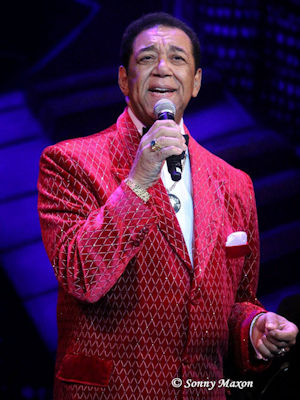 As recently as four years ago, in 2017, he released a dance single that reached number one on the Euro Indie Music Chart, at one point spending four consecutive weeks there. Titled “Knock Knock (Let Me In),” it was released with no photo of the artist, who was in his late 70s at the time. With no opportunity for age-ism, fans embraced the track, credited to Buzzy’s Boulevard, and made it a hit. A second single, “Ooh Ya Wit,” followed and it also took off.
As recently as four years ago, in 2017, he released a dance single that reached number one on the Euro Indie Music Chart, at one point spending four consecutive weeks there. Titled “Knock Knock (Let Me In),” it was released with no photo of the artist, who was in his late 70s at the time. With no opportunity for age-ism, fans embraced the track, credited to Buzzy’s Boulevard, and made it a hit. A second single, “Ooh Ya Wit,” followed and it also took off.
“Little kids, 14 and 15 year sold, were e-mailing me, who are you? I need a picture of you. I love your song. Where are you from? It blew my mind,” said Johnson. “It felt wonderful. It had me wishing I was that young again cause the kids loved it. But you can’t change time. You can’t change years. You know what I mean?”
He added, “I’m not just an oldies artist. I stay up to date. I mean, I love the ‘50s music, but I also have to stay up with what’s going on.”
Johnson and his wife Theresa Trigg, who run Hot Fun Records, also work with young artists so they stay abreast of the latest musical trends. For more details of Hot Fun Records log on to https://hotfunrecords.com/
When Johnson is actively touring again, he plans to do shows under the banner of Terry Johnson’s Flamingos and also as Terry Isaiah Johnson. Shows featuring his first, middle and last name will allow him the flexibility to do classic songs as well as modern material he has recently written and produced.
“Terry Isaiah Johnson will be doing “Knock Knock (Let Me In)” and all the other songs I can’t tell you about yet,” he said.
Johnson and his wife have been together for 46 years. Working in the same industry, he said, has been a blessing.
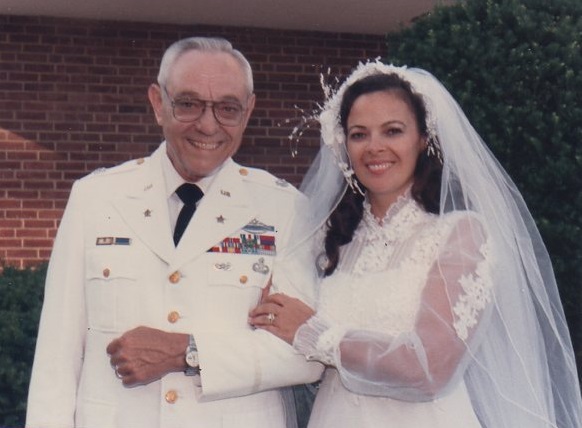
Theresa Trigg with her father Lt. Col. Harry E. Trigg
“So many people, you know, the husband has an eight-hour job, the wife has another job, you know, they barely see each other, and then they get into a bad mood from the job or something and they come home and they get into an argument over whatever. Us, we don’t go through that.”
Johnson added, “We’re together. She’s my best friend. She’s my buddy. She’s my wife. She’s my lover. She’s my everything I could need you know, and she says the same about me, so, you know, we believe each other.”
Johnson and Trigg, it seems, will once again hit the road in the fall, at least for a few dates, starting with a Legends of Doo Wop & Rock ‘n’ Roll Vol. III concert on Sept. 25 at the Bonita Center for The Arts in San Dimas, CA.
For more details of Terry Isaiah Johnson log in to https://terryisaiahjohnson.com/
For more details on future shows, log onto http://www.theflamingos.com
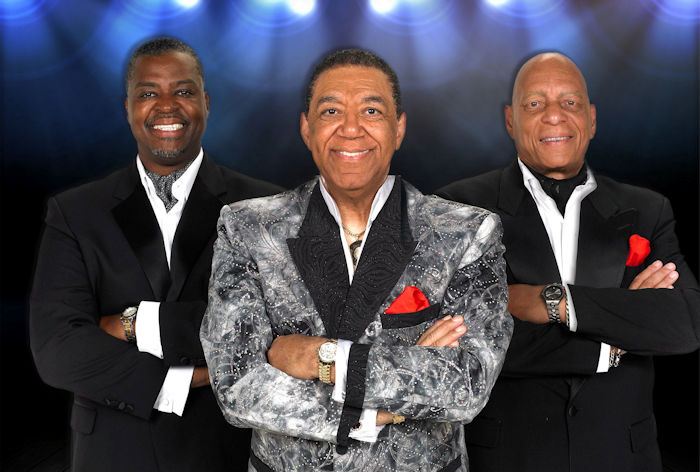
________________________________________________________
All photographs used with permission Terry Johnson
